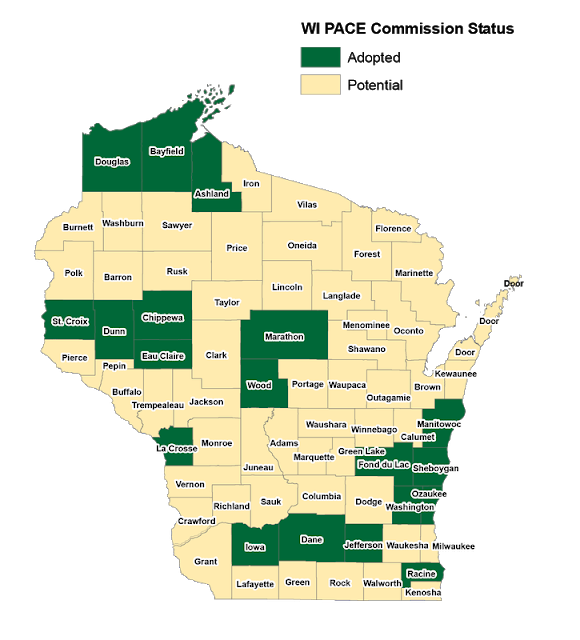
by jboullion | Jun 21, 2017 | Uncategorized
by Michael Vickerman, Program and Policy Director
Since 2016, Wisconsin counties have begun opting into an innovative program called PACE (Property Assessed Clean Energy), which enables property owners to obtain low-cost, long-term loans for energy efficiency, renewable energy, and water conservation improvements. At its most recent meeting on June 16, the Dane County Board of Supervisors approved a resolution authorizing the County to join the program. In so doing, Dane joined 18 other Wisconsin counties that offer this special financing tool to leverage clean energy investments on commercial and industrial properties.

Projects financed using PACE can generate positive cash flow upon completion with no up-front, out-of-pocket cost to property owners—eliminating the financial barriers that typically prevent investment in revitalizing aging properties. The term of a PACE Financing may extend up to the useful life of the improvement, which may be as high as 20 years or more, and can result in cost savings that exceed the amount of the PACE Financing. The result is improved business profitability, an increase in property value, and enhanced sustainability.
PACE Financing is sourced from an open lending market and secured through a voluntary PACE Special Charge, repaid directly to the lender. Like property taxes, PACE Financings may be transferred to the next property owner if the property is sold. The remaining balance of the PACE Financing is repaid by the subsequent owner, who continues to receive the benefits of the improvements from the project. Eligible commercial properties include multifamily buildings of five units or more, as well as industrial, private nonprofit, agriculture, and hospitality properties.
A voluntary initiative, PACE Wisconsin began taking shape last year when three state organizations–Green Tier Legacy Communities, the Counties Association and League of Municipalities– joined forces to launch a Joint Powers Commission and to recruit counties to enter into the program. Member counties agree to adopt a Model PACE Ordinance when they join the Commission, which authorizes the county to impose a PACE special charge, collect payments for the special charge in installments, place those installments in the tax roll at its discretion, and delegate that authority to the PACE Commission.
For more information on Wisconsin’s PACE program, including an up-to- date map of participating counties, visit www.pacewi.org.
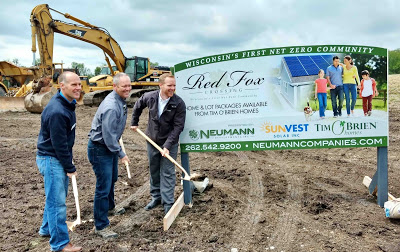
by jboullion | May 26, 2017 | Uncategorized
For the first time ever in Wisconsin, prospective home buyers have the option of purchasing a brand-new house with a solar array sized to offset 100% of household electricity use. A trio of Wisconsin companies broke ground this week on a residential development in New Berlin that will integrate rooftop solar arrays into all 34 residences built there.
 |
Representatives from Neumann Companies, SunVest Solar, and
Tim O’Brien Homes break ground on May 23, 2017 at Wisconsin’s
first net-zero planned community. |
Developed by Pewaukee-based Neumann Companies, the home sites at Red Fox Crossing, located on the southwest corner of S. Sunny Slope Road and W. Grange Ave., will be oriented to fully capture the solar energy available. Madison-based Tim O’Brien Homes will design and construct the solar-ready houses, and Pewaukee-based SunVest Solar will design and install each solar system, ranging from six to eight kilowatts.
Households that purchase a new house in Red Fox Crossing will finance the solar array through a 30-year mortgage with a 4% interest rate. As the tables below show, the power of long-term financing enables home buyers to reap substantial savings with the first monthly payment. Indeed, the return on investment for these solar arrays will range between 10% and 20% for the duration of the mortgage.
When fully built out, Red Fox Crossing will have between 200 and 260 kilowatts of behind-the-meter solar capacity in operation. It is on a path to become Wisconsin’s first net zero (electricity) community.
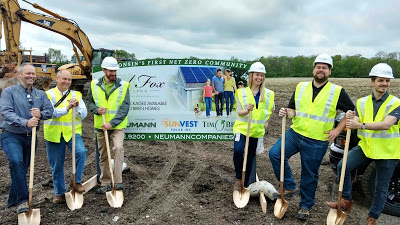 |
| Members of the SunVest Solar team at the groundbreaking. |
“It has always been our dream to offer an energy independent community,” said Matt Neumann, principal of Neumann Companies. “We are excited to have all three companies involved in creating Wisconsin’s first net zero community.”
|
PRICING FOR A 7 KILOWATT SOLAR PV
SYSTEM
|
|
System Price
|
$21,000
|
|
Focus on Energy Rebate
|
$2,000
|
|
Federal Tax Credit (30%)
|
$6,000
|
|
Out-of-Pocket Cost*
|
$13,000
|
* after tax credits and rebate
|
$13,000 FINANCED INTO 30-YEAR
MORTGAGE AT 4%
|
|
Monthly Payments
|
$62/month
|
|
Solar Production Value
|
$98/month*
|
|
Monthly Savings
|
$36/month
|
* calculations based on We Energies current residential rates
According to a WTMJ-TV report, the Neumann team expects individual lots to be ready for permitting and construction sometime this fall, and the first home to be completed and generating electricity by next spring.
“Red Fox Crossing has the potential to be the turning point in building a more sustainable community and neighborhood in Wisconsin, versus focusing on only one home at a time,” said Tim O’Brien, president of Tim O’Brien Homes.
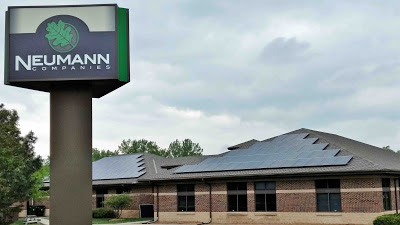 |
| Neumann Companies’ new office in Pewaukee, which also features solar panels on the roof. |
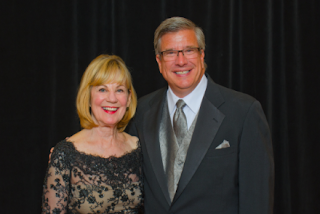
by jboullion | May 11, 2017 | Uncategorized
 |
Co-Chairs of the Wisconsin Legislature’s Joint Finance
Committee, Sen. Alberta Darling and Rep. John Nygren. |
Positive steps were taken today on two issues of importance for clean energy and Wisconsin power customers!
The State Legislature’s Joint Finance Committee met to set the budget of the Public Service Commission for 2017-2019, which includes both Focus on Energy and intervenor compensation funds.
Both of the wins described below gained 16-0 bipartisan votes by the Committee, which is made up of 12 Republicans and 4 Democrats.
First, the budget for intervenor compensation was partially restored after a 66% cut two years ago. The budget going forward will double to $742,500 annually. These funds enable nonprofit and citizen-based organizations to bring technical and legal expertise to proceedings at the Public Service Commission. RENEW Wisconsin has historically used this fund to support our advocacy in utility rate cases, power plant proposals, and numerous other proceedings at the PSC that impact renewable energy.
In addition, the Citizens Utility Board frequently uses this fund to bring expertise to cases in order to keep utility rates as low as possible for residential and small business customers across Wisconsin. Governor Walker had proposed this restoration of funds in his budget, and the Committee adopted it. This is great news, and we applaud Governor Walker and members of the Joint Finance Committee for adopting this provision.
Secondly, Focus on Energy’s budget will remain unchanged, allowing for the most cost-effective energy efficiency and renewables projects to be funded. The Governor has proposed to eliminate the ability for school districts to borrow above their revenue limit to fund energy efficiency and renewable energy improvements (commonly called “Act 32” projects). To backfill that change, the Governor proposed allocating an additional $10 million from Focus on Energy’s budget for schools above what they spent last year, which would have earmarked nearly $15 million out of the total $93 million for schools alone.
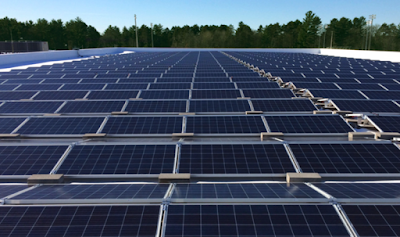 |
Solar PV installation on Lakeland Union High School in Minocqua,
part of an energy improvement project funded under the “Act 32” school district
revenue exemption. See the full case study from SunPeak. |
|
Concerns had been raised that schools would not be able to use that much Focus on Energy funding. The proposed earmark could have siphoned funding away from private business installations in energy efficiency upgrades, leading to unspent dollars in the Focus on Energy program and a less cost-effective set of investments.
The Committee voted 16-0 against the Governor’s proposal, leaving the Focus on Energy budgets unchanged. This is very good news since the program returns over $3.50 for every dollar invested, and schools will still have ready access to incentives through existing programs.
This sets up an important vote later in the Joint Finance Committee schedule regarding the Governor’s proposal to repeal the Act 32 school district revenue exemption.
RENEW Wisconsin was supportive of both of these successful measures through our participation in the Customers First Coalition.
The biennial budget needs the approval of both the Assembly and the Senate before being signed by the Governor. Typically, the budget process lasts through June.
For more information on these topics and the state budget, please see RENEW’s Clean Energy Summary of Governor Walker’s Budget, and our recap of the 2015-17 state budget.
Finally, please support our work: become a member of RENEW Wisconsin today!
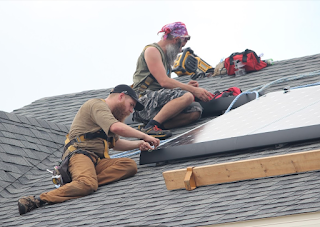
by jboullion | May 10, 2017 | Uncategorized
For Immediate Release
More Information:
Katie Crawley, Mayor’s Office
Katherine
Klausing, RENEW Wisconsin
614-406-1105
 |
A team from Full Spectrum Solar installs a solar array
for a 2016 Group Buy Participant |
May 9, 2017 –
Madison. The Cities of Madison and Middleton have selected the winning offer
from contractors who competed to serve the MadiSUN Solar Group Buy program, which
helps residents easily and affordably invest in solar electric systems on their
homes. The cities have selected a collaborative bid from Full Spectrum Solar and Midwest
Solar Power, two solar installation companies based in Madison.
The MadiSUN Solar
Group Buy program allows Madison and Middleton residents to “go solar”
together. MadiSUN used a competitive Request for Proposals process to
seek offers from solar companies across the region, and dozens of
companies were invited to bid. For the first time, the program selected a
collaborative bid from two companies, who will offer the same price and
services.
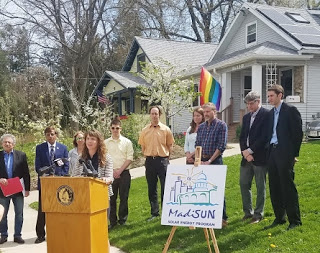 |
| The 2017 MadiSUN solar program launched on April 24, 2017 |
Katherine Klausing, MadiSUN Program Manager, said “we were really pleased with the
competitive offers we received.” The program evaluated bids based on pricing,
work quality, customer service and the company’s qualifications. “This is going to be a great deal for
families who are interested in going solar this year. Our participants say that
they feel better knowing there’s a trusted company that has been vetted by our
program. By going with the group buy and benefitting from the low price we
negotiate, families can save an extra 10 percent compared to what they would
pay to go solar alone.”
Alarik Rosenlund,
Co-Owner of Midwest Solar Power, says his company is happy to partner with
the program to bring more solar energy to local residents. “This year may
be a real sweet spot for anyone looking at installing solar, especially with
the tax credits and rebates available,” Rosenlund said. But it’s not just
about the economics. “This is a great way for people to take action on
something really important.”
The cost of installing solar has never been lower, and households
can receive a Federal Tax Credit for 30 percent of the system cost, while
Wisconsin’s Focus on Energy program offers up to $2,000 in additional rebates.
New solar education
events were also announced, aimed at helping residents learn more about
solar energy and the options available for installing solar. All events are
free and open to the public. The dates, times, and locations information
sessions are available at
www.madisunsolar.com/upcoming-events
and enclosed below.
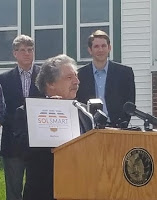 |
Madison Mayor Paul Soglin
accepted a SolSmart Gold award |
Madison earned a
“gold” designation from SolSmart, the highest level of
recognition from a national program under the
U.S. Department of
Energy’s SunShot Initiative. The “gold” designation recognizes the city’s
efforts to accelerate solar development, from improving permitting and zoning
for solar, to investing in financing and solar workforce training programs. The
announcement took place at on Monday at the National Planning Conference in New
York City.
“Madison’s commitment to continued utilization of solar
energy is genuine,” said Madison Mayor
Paul Soglin in a statement. “We have our Green Power Program in
which we train new workers to install solar, our goal of producing one Megawatt
of Solar by 2020 and incredible partnerships like SolSmart and others. We
are on our way!”
As a
SolSmart Gold designee, Madison received national recognition for adopting
programs and practices that make it faster, easier, and cheaper to go solar. A
SolSmart designation is a signal that the community is “open for solar
business,” helping to attract solar industry investment and generate economic
development and local jobs. Madison recently became the first community
in Wisconsin to commit to a goal of 100 percent renewable energy.
About
SolSmart
SolSmart
is a national designation and technical assistance program that recognizes
leading solar communities and empowers additional communities to expand their
local solar markets. Funded by the U.S. Department of Energy SunShot
Initiative, SolSmart strives to cut red tape, drive greater solar deployment,
and make it possible for even more American homes and businesses to access
solar energy to meet their electricity needs. Learn more at SolSmart.org.
About MadiSUN Solar
Group Buy
MadiSUN
works to expand solar energy adoption through a comprehensive, community-wide
approach. This group purchase program
is operated by RENEW Wisconsin Inc., a nonprofit organization, on behalf of the City of Madison, with support from the
City of Middleton. The goal of the program is to increase solar education and adoption in
the Madison and Middleton areas through a group purchase and competitive
bidding process. In conjunction with this program, RENEW Wisconsin and the City
of Madison will partner with Summit Credit Union to provide a special solar
loan program for Madison residents. This
summer, participants can learn more and sign up at madisunsolar.com.
Solar Information
Sessions
1. Madison
College, Truax Campus
Tuesday May 16th at 6pm
Protective Services Building, Room 215,
1701 Wright St, Madison
2. Goodman
Community Center
Tuesday June 6th at 6pm
Merrill Lynch Room, 149 Waubesa St, Madison
3. Good Shepherd
Lutheran Church
Tuesday June 13th at 7pm
Peterson Hall, 5701 Raymond Rd, Madison
4. Middleton
Public Library
Wednesday June 28th at 6:30 p.m.
7425 Hubbard Ave, Middleton
5. Catholic
Multicultural Center
Thursday July 6th at 7pm
1862 Beld St, Madison
6. Capital
Brewery & Bier Garten
Monday July 17th at 5:30pm
7734 Terrace Ave, Middleton
7. First
Unitarian Society
Sunday July 30th at 12:30 p.m.
900 University Bay Dr, Madison
###
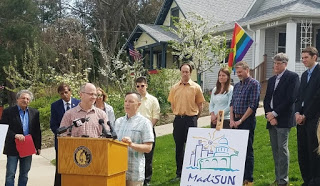
by jboullion | Apr 24, 2017 | Uncategorized
More Information:
Katie Crawley, Mayor’s Office
Katherine
Klausing, RENEW Wisconsin
614-406-1105
April 24, 2017 – Madison. Today the Cities of Madison and Middleton
announced the launch of the MadiSUN Solar Group Buy program, a collaborative
program that helps residents easily and affordably invest in solar electric
systems on their homes. The announcement continues the steady stream of
renewable energy commitments and solar projects announced in Wisconsin, and
follows 2016’s successful solar group buy program—the largest in Wisconsin to
date.
 |
Jay Edgar and Josh Feyen participated in the
2016 MadiSUN Group Buy. |
The MadiSUN Solar
Group Buy program will enable Madison and Middleton residents to “go solar”
together. Through the group buy program, a team of community members
requests offers from solar companies across the region. The program then
pre-qualifies a price and service provider to make it as easy as possible for
people to join the program. The City’s investment in marketing and
competitive bidding will drive down the cost for each participant. The cost of
installing solar has never been lower, and households can receive a Federal Tax
Credit for 30 percent of the system cost, while Wisconsin’s Focus on Energy
program offers up to $2,000 in additional rebates.
The program, through its contractor RENEW Wisconsin, has begun recruiting
interested households to participate. This summer, citizens can learn more and
sign up at madisunsolar.com.
Madison Mayor Paul Soglin lauded the
group buy program. “These programs are proven vehicles for making rooftop
solar more accessible and affordable for homeowners in the community, and
that’s why we thank MadiSUN,” he said.
The City will partner
Summit
Credit Union to offer a special
Solar
Energy Loan Program where residents can finance 100 percent of a solar
electric system with no fees or collateral. “Summit Credit Union is thrilled to
continue partnering with the City of Madison bringing solar technology to the
area,” they said in a statement. Details on the MadiSUN loan program can
be found on the website
summitcreditunion.com or by calling
800-236-0985.
Six educational
events were also announced as part of the program, aimed at helping
residents learn more about solar energy and the options available for
installing solar. All events are free and open to the public. The dates, times,
and locations information sessions are available at
www.madisunsolar.com/upcoming-events.
 |
Madison Mayor Paul Soglin accepts
SolSmart’s “Gold” designation. |
Madison earned a
“gold” designation from SolSmart, the highest level of
recognition from a national program under the U.S. Department of
Energy’s SunShot Initiative. The “gold” designation recognizes the city’s
efforts to accelerate solar development, from improving permitting and zoning
for solar, to investing in financing and solar workforce training
programs. Madison recently became the
first community in Wisconsin to commit to a goal of 100 percent renewable
energy. The City is already progressing toward that goal, including initiatives
like a citywide solar apprenticeship program whose trainees will install
another 100 kilowatts of solar on city facilities.
Middleton Mayor
Gurdip Brar pointed to the city’s many solar developments in recent months,
such as the 100kW atop the Middleton Police Station. “We at the City of
Middleton are proud to work with our neighbors to bring the benefits of solar
energy to all of our communities here,” he said. “Going forward, Middleton and
Madison are going to be cooperating a lot more,” he said.
“2017 is going to be a great year for solar, and we
encourage Middleton families to take advantage of this opportunity,” Brar said.
“This is a great day for our communities.”
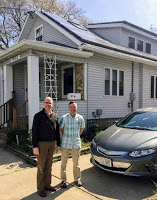 |
Jay Edgar and Josh Feyen use their solar panels
to power their hybrid-electric car. |
Homeowners Josh Feyen and Jay Edgar
hosted the event outside their home, where they installed 6 kW of solar panels
in 2016 as part of that year’s MadiSUN Group Buy program. The array also powers their new car, a
hybrid-electric Chevrolet Volt. Feyen
estimates that the system will pay for itself through energy cost savings in about
10 years “and then we’re going to be getting about 20 years of free
electricity, including charging our car three times per week. So if you think
about it, we’re saving a lot of money from the energy we’re creating and the
gasoline we’re not putting in our car,” said Feyen. They were also able to take
advantage of the federal tax credit and rebates from the Focus on Energy program.
Feyen and Edgar have also been talking to family and friends
about the benefits of the MadiSUN program. “We’ve kind of been Johnny
Appleseed,” Edgar says.
 |
Katherine Klausing, MadiSUN Program Manager,
gives concluding remarks at the 2017 launch. |
MadiSUN Program
Manager Katherine Klausing concluded by saying, “We’ve built a lot of
momentum leading to this event. As successful as the past year has been, we
believe 2017 is going to be even better.”
**END**
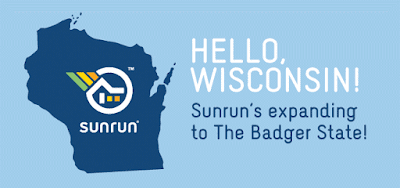
by jboullion | Mar 29, 2017 | Uncategorized
 San Francisco-based Sunrun, the leading residential solar company in the nation, announced today its intention to venture into Wisconsin and begin offering customers several options for financing a new solar PV system.
San Francisco-based Sunrun, the leading residential solar company in the nation, announced today its intention to venture into Wisconsin and begin offering customers several options for financing a new solar PV system.
The entrance of Sunrun into Wisconsin represents the first time a national rooftop solar company has ventured into the Midwest. Sunrun will target southeast Wisconsin counties from Sheboygan and Fond du Lac in the north to Kenosha, Walworth, and Rock in the south.
Says Amy Heart, Sunrun’s Director of Public Policy and a long-time solar advocate in Wisconsin: “We are excited to be the first national residential solar company to serve the Midwest, and I personally could not be more proud to help Sunrun call Wisconsin home. Wisconsin has an opportunity to lead the region with solar energy–leading to new jobs and a stronger economy.”
In an interview with Midwest Energy News, Sunrun’s Heart explains the reasoning behind her company’s decision to select Wisconsin as its point of entry into the Midwest.
For more information on Sunrun’s financing options and opportunities for employment, visit the full press release here.














